In a move that has sent ripples through both the mixed martial arts (MMA) and tech industries, TKO Group’s UFC has inked a multimillion-dollar partnership with Meta. While many are heralding this as a breakthrough for UFC, I find myself more skeptical than celebratory. The brash melding of a sports organization with a tech giant not only raises eyebrows but also must ignite serious questions about the future of both brands. The decision to forge such an alliance, driven by a cash injection rather than a genuine affinity between UFC and Meta’s countless products—ranging from Meta AI to WhatsApp—should be scrutinized.
The UFC’s President, Dana White, exclaimed that Meta’s involvement will “blow away UFC fans,” but what does that even mean? Branding plastered on the UFC’s Octagon might attract attention momentarily during pay-per-view events, but will it resonate with the core audience? This partnership leans heavily on the technology side, with vague promises of integrating AI glasses and social media features into the visceral experience of mixed martial arts. Yet, MMA’s roots lie far outside the tech-driven illusion Meta represents. Fans crave authenticity, not a digital marketing ploy constructed in a boardroom.
Consequences for Authenticity and Loyalty
The danger here is immense. UFC operates in a culture steeped in raw athleticism and street credibility. The infusion of Meta’s digital empire might dilute that authenticity. Will UFC fighters soon find themselves embroiled in content creation for Threads rather than focusing on their craft? As Grant Norris-Jones, TKO’s head of global partnerships, declared, Meta will become an “official marketing partner” and “wearable partner.” This sort of corporate shell game risks alienating the very fan base the UFC has worked tirelessly to cultivate.
Moreover, the integration of Meta’s technology may come at the expense of the fighters. As we see the paradigm shift from combat sports to tech spectacles, one must wonder: where is the line drawn? The relationship between UFC and corporate interests has historically been exploitative, often putting financial gain over athlete welfare. This partnership could deepen those concerns, leading to a commodification of fighters, turning them from athletes into mere avatars for consumerism.
Zuckerberg’s Entertaining Hubris
At the center of this deal lies Mark Zuckerberg—a figure whose own controversies in the tech world paint him as a polarizing individual. With his penchant for mixing business with personal interests, as evidenced by his vocal support for combat sports, one must ponder the real motivations behind this deal. Given his background, it’s hard to shake the feeling that Zuckerberg sees the MMA world as a canvas he can manipulate. Whether through his personal attendance at UFC events or his relationship with fighters, there’s a sense that Zuckerberg views combat sports not as a tradition but rather as a playground for corporate expansion.
Zuckerberg’s comments regarding “masculine energy” and his association with controversial figures like former President Trump only add fuel to the fire. If the UFC is to forge ahead with Meta, it must navigate this treacherous landscape with extreme caution. Are we really ready for a world where Zuckerberg’s vision for masculinity dominates the aggressive integrity of mixed martial arts? If UFC fans are hoping that corporate alliances like these will enhance the experience, they might be setting themselves up for disappointment.
The Future: A Digital Mirage?
While UFC fans like to relish the physical intensity of the sport, Meta’s involvement raises unsettling questions about the trajectory of that experience. Will Octagon events soon transition from highlights of human endurance and resilience to promotional tech showcases? If UFC becomes merely a channel for Meta’s gadgets and social media content, we could see a farcical merging of genuine sport with a relentless corporate theater, leaving fans feeling betrayed.
Moreover, the announcement of a new fighter rankings system bolstered by Meta tech hints at a future where algorithms, rather than performance, dictate success. In an age where data breeds an obsession with quantification, it is essential for the UFC to retain its values and keep the spirit of genuine competition alive. Otherwise, this partnership could transform into a cautionary tale of what happens when an era of authenticity is traded for a technological mirage.
Ultimately, UFC’s deal with Meta symbolizes more than a marriage of convenience; it embodies a crossroads fraught with complex implications for the sport, its athletes, and its fans. As we move forward, the stakes have never been higher, and the ramifications are yet to be fully revealed.


Leave a Reply